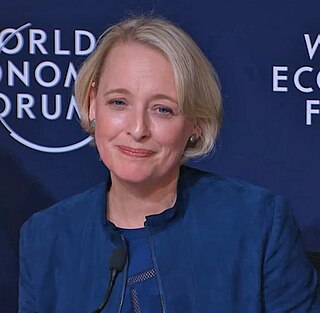A chief executive officer (CEO) is the highest officer charged with the management of an organization – especially a company or nonprofit institution.

The Conference Board, Inc. is a 501(c)(3) non-profit business membership and research group organization. It counts over 1,000 public and private corporations and other organizations as members, encompassing 60 countries.

Women in Kazakhstan are women who live in or are from Kazakhstan. Their position in society has been and is influenced by a variety of factors, including local traditions and customs, decades of Soviet regime, rapid social and economic changes and instability after independence, and new emerging Western values.
Scott Griffith was the chairman and chief executive officer of Zipcar, Inc. from February 2003 until his resignation on March 15, 2013, following the acquisition of Zipcar by Avis Budget Group. As of October 2020, Griffith is the CEO of Ford Autonomous Vehicles & Mobility Businesses at Ford Motor Company.

Women's World Banking is a global nonprofit organization dedicated to women's economic empowerment through financial inclusion.
Catalyst Inc. is a global nonprofit founded by feminist writer and advocate Felice Schwartz in 1962. Schwartz also served as Catalyst's president for 31 years.

Female entrepreneurs are women who organize and manage an enterprise, particularly a business. Female entrepreneurship has steadily increased in the United States during the 20th and 21st century, with number of female owned businesses increasing at a rate of 5% since 1997. This growth has led to the rise of wealthy self-made females such as Coco Chanel, Diane Hendricks, Meg Whitman, and Oprah Winfrey.

Mallika Srinivasan is an Indian industrialist and is the Chairman and Managing Director of Tractors and Farm Equipment Limited, a tractor major incorporated in 1960 at Chennai, India. She is also the Chairperson of the Public Enterprises Selection Board (PESB) constituted by the Government of India. She is additionally on the Global Board of U.S.-India Business Council (USIBC), and the Boards of AGCO Corporation - United States. She is a core member of the BRICS Women’s Business Alliance and a member of India-US CEO Forum. She is also the member on the Governing Body of Stella Maris College - Chennai.
Gender representation on corporate boards of directors refers to the proportion of men and women who occupy board member positions. To measure gender diversity on corporate boards, studies often use the percentage of women holding corporate board seats and the percentage of companies with at least one woman on their board. Globally, men occupy more board seats than women. As of 2018, women held 20.8% of the board seats on Russell 1000 companies. Most percentages for gender representation on corporate boards refer only to public company boards. Private companies are not required to disclose information on their board of directors, so the data is less available.
Gender diversity is equitable or fair representation of people of different genders. It most commonly refers to an equitable ratio of men and women, but also includes people of non-binary genders. Gender diversity on corporate boards has been widely discussed, and many ongoing initiatives study and promote gender diversity in fields traditionally dominated by men, including computing, engineering, medicine, and science. It is argued that some proposed explanations are without merit and are in fact dangerous, while others do play a part in a complex interaction of factors. It is suggested that the very nature of science may contribute to the removal of women from the 'pipeline'.
Ilene S. Gordon is an American business executive. She became CEO, president, and chairman of Ingredion in May, 2009 and became the 21st female CEO of a Fortune 500 company when Ingredion's sales reached $6 billion for the first time, in 2012. As of 2014 she was one of only 24 women who were CEOs of Fortune 500 companies. She retired from the position in 2017.
Africapitalism is the economic philosophy that the African private sector has the power to transform the continent through long-term investments, creating both economic prosperity and social wealth. A think tank tasked with studying the philosophy, the Africapitalism Institute, was formally launched during the 2014 World Economic Forum on Africa in Abuja, Nigeria in May of that year.

Sukhinder Singh Cassidy is a technology executive and entrepreneur. Formerly the president of StubHub, she has worked at various tech and media companies including Google, Amazon and News Corp, Yodlee (YODL), and Polyvore. In 2011, she founded JOYUS, the video shopping platform for women, and served as CEO then Chairman until 2017. Singh Cassidy is also Founder of theBoardlist.
Women's Entrepreneurship Day (WED) is a day on which the work of women entrepreneurs is observed and discussed, held every day of each year. The inaugural event was held in New York City at the United Nations, with additional events being held simultaneously in several other countries. 144 nations overall recognized the first WED in 2014, which included the presentation of the Women's Entrepreneurship Day Pioneer Awards. The organization behind WED also has an ambassadorship and fellowship program.
Women in Tech Africa (WiTA) is an organization with a focus on entrepreneurship expansion and multiplying the numbers of females in technology, especially in Africa. It was founded by Ethel D Cofie. Over the years, WiTA has strategically focused on enabling women to drive Africa's growth story and create an impact on personal life through technology. Currently, its target audience comprises aspiring female tech entrepreneurs between the ages of 18 and 40. Women in Tech Africa is the largest group on the continent with membership across 30 countries globally with physical chapters in Ghana, Malawi, Zimbabwe, Somaliland, Germany, Ireland, Kenya, Tanzania and Mauritius.
Ayisha Fuseini is a Ghanaian social entrepreneur. Fuseini is the founder and CEO of a company called Asheba Enterprise, registered in 2013 in Ghana, working with over 600 women in rural communities in Tamale; Northern region. She established a processing center that reduces the workload of the women she works with. Her enterprise also provides financial services to support women in the Shea business. Her company produces beauty products such as soap, body creams and other products using high quality shea butter. She is also a supplier of shea butter to The Body Shop chain.

The Global Entrepreneurship Summit is an annual event organized by the federal government of the United States, in partnership with foreign government hosts. The summit originated from an event organized by the Obama Administration called the Presidential Summit on Entrepreneurship, which was held in April 2010 in Washington, D.C. It brought together entrepreneurs from the United States, Europe, Africa, the Middle East, South Asia, and Southeast Asia to discuss the importance of social and economic entrepreneurship, establish entrepreneurship as an important area of policy focus, and strengthen mutually beneficial relationships between entrepreneurs.

Julie Terese Sweet is an American business executive and attorney. She is chair and chief executive officer (CEO) of Accenture, a multinational professional services company.

Lorraine Hariton is the president and CEO of Catalyst, a New York City–based nonprofit organization committed to the advancement of women in the workplace.
Evelyn Namara is a Ugandan technologist, technology entrepreneur and corporate executive who founded Vouch Digital in 2017. She serves as a non executive director on the KCB Bank Uganda Board of Directors, MTN Mobile Money Uganda Limited Boards of Directors and also serves on the Refactory Advisory Board. She is first Ugandan to win the Anita Borg Change Agent Award Winner in October 2012. She is the founder of Innovate Uganda










